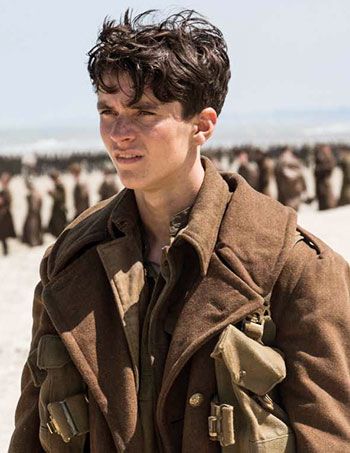 'It's not combat, but deliverance that dictates the action in Dunkirk,' notes Sukanya Verma.
'It's not combat, but deliverance that dictates the action in Dunkirk,' notes Sukanya Verma.
War is the ultimate state of chaos.
And its damning, damaging consequences torment the screen from start to finish in Christopher Nolan's Dunkirk, which jumps slam-bang into the heart of hostility with chilling urgency.
Nolan's ingenuity in Dunkirk is a departure from high-browed concepts of science and space engaged in reverie-induced heists and time-bending breakthroughs or the distinctive showmanship that revolutionised comic book mythology and fashioned a new language of deception in the history of big reveals.
Not to say it's short on spectacle.
If anything, Dunkirk's immersive IMAX detailing and volatile intensity turns up the volume frequently to recreate a relentless climate of bombs and bullets.
Yet, Nolan's latest tour de force is rooted in the reality of World War II and draws its impressionistic vision by submitting itself to the ideals of survival and nature of defeat minus the bloodshed.
It's not combat, but deliverance that dictates the action in Dunkirk, split as it is into three different timelines (a week, an hour, a day) and mediums (land, water, air), conveying the grim mood and magnitude of its crisis.
Strewn all across the beach at the coastal town of Dunkirk in northern France, countless sombre-faced British and French troops scramble atop a pier waiting to be ferried across the English Channel under the leadership of a constrained naval commander (a wonderfully wry Kenneth Branagh).
It's a long shot since the water is shallow, but also their only way out as Germans inch closer from every quarter.
In the vicinity, sly schemes and growing suspicions plague a young group of privates (Fionn Whitehead, Harry Styles and Aneurin Barnard are a commendable mix of naive and restless) compelling them to confront their individual cynicism and conscience.
On sea, a mariner (Mark Rylance displaying a farsighted wisdom that becomes him) and two teenagers (Tom Glynn-Carney and Barry Keoghan do well), part of a large-scale civilian rescue flotilla, cruise towards the scene of action, bailing out a shell-shocked soldier (a terrific Cillian Murphy) enroute.
On the aerial front, an RAF pilot (a scene-stealing Tom Hardy) gambles with diminishing fuel to thwart the Luftwaffe after his colleague (an able Jack Lowden) has to force land.
He's the single most embodiment of breathtaking daredevilry in a film where almost every single character lays bare his deepest vulnerability.
Nolan doesn't get into the behind-the-scenes politics of the occasion or personify the enemy beyond weapons, choosing to single-mindedly focus on the challenges of a massive evacuation.
Where the shrewdly shuffled chronology converges to declare a collaborative triumph, it's the sense of Hitchcockian suspense and omnipresent danger Nolan imparts to a well-known feat that gives us an intimate understanding of what would come to be known as the 'Dunkirk Spirit.'
Events in history, big or small, condense into authentic or falsified information in due course, but can be documented in only raw, uncertain terms in real time.
And that's the sort of tactile obscurity Nolan colours his virtually anonymous characters with as they grapple with heroism and humanity.
Unlike classic war epics suffused in uniform-clad bravado and glory, Dunkirk's patriotism has less to do with military and everything to do with mankind.
War is as burdensome as it is brutal.
Sometimes surviving the enemy is as momentous as fighting him. Dunkirk's claustrophobic imagery (shot by Hoyte van Hoytema) of trapped, collapsing, drowning, distraught men underscores this Titanic-reminiscent ordeal.
Ironically, the only time its cheerless, muted palette comes alive is when the blazing flames of deadly orange disturb the serenity of its sapphire nights and aquamarine days.
Nolan's partner in sound, Hans Zimmer is inspiring as usual but a tad over utilised, especially around the Rylance arc, rendering the scenes expository and mawkish in ways that contradicts the director's reticent sensibilities.
Sophisticated he may be, but certainly not cold.
Nolan's cinema is akin to meditating on screen and hitting transcendental peaks. And so it's the quieter moments and evocative vignettes of fear, fatigue, guilt, desperation and homesickness that hit harder than its sensory profusion.
Like the rare dollop of jam, a nondescript man walking into the wild waves and a smiling lady from Dartmouth stood out and moved me with their profundity in ways I was expecting and still came out surprised.












 © 2025
© 2025